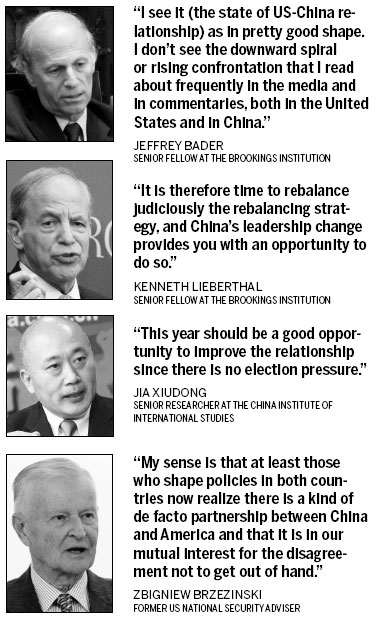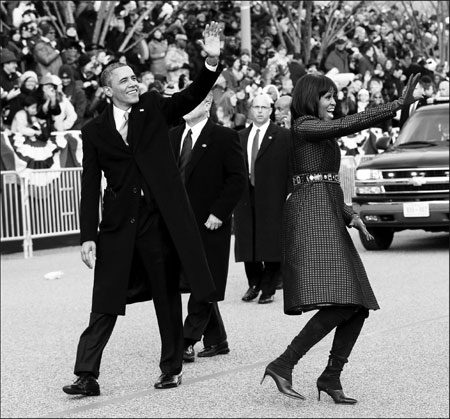Solid agenda outlined for second term
Updated: 2013-01-22 11:57
By Chen Weihua in Washington (China Daily)
|
||||||||

|
US President Barack Obama and first lady Michelle Obama walk along Pennsylvania Avenue toward the White House during the inaugural parade from the US Capitol in Washington on Monday. Doug Mills / Reuters |
Free from the pressure of getting re-elected, US President Barack Obama on Monday used his second-term inauguration speech to spell out an unabashedly liberal agenda, promising to work to protect of gay Americans' rights, a more-welcoming immigration policy and policies to combat the effects of climate change.
Before a smaller crowd than the one that greeted his historic ascension to the nation's highest office four years ago, Obama took his oath of office in a public ceremony that followed his and Vice-President Joseph Biden's official, private inaugurations a day earlier on the constitutionally mandated date of Jan 20.
The ceremony on the steps of the US Capitol was attended by about a half-million people, according to various estimates, most of whom watched from the packed National Mall on a chilly late morning and early afternoon. That compares to the 1.8 million who turned out for Obama's inauguration in 2009, though Monday's crowd also cheered the president enthusiastically.
The 44th US president cited ideals of the nation's founders in issuing vows to defend legislation enacted and policies outlined in his first term, while affirming values traditionally associated with his Democratic Party. He highlighted the 2010 overhaul of the healthcare system, preservation of social-welfare programs, restoration of the dwindling middle class and a demand that rich Americans pay more in taxes.
Obama also took on the zeal for limited government espoused by conservatives in Congress, but he urged pragmatism in getting things done: "Progress does not compel us to settle centuries-long debates about the role of government for all time - but it does require us to act in our time." He said the country "must harness new ideas and technology to remake our government, revamp our tax code, reform our schools, and empower our citizens with the skills they need to work hard or learn more, reach higher".
At 19 minutes, Obama's speech was fairly brief by historical standards but it did contain some poetic flourishes - something many found lacking from 2009.
"Through blood drawn by lash and blood drawn by sword, we learned that no unions founded on the principles of liberty and equality could survive half-slave and half-free. We made ourselves anew, and vowed to move forward together," Obama said.
His words conjured the day's added significance. This year marks the 150th anniversary of the Emancipation Proclamation, President Abraham Lincoln's decree ending slavery. This year also marks 50 years since the famous "I have a dream" speech - on the very same National Mall - by civil-rights legend Martin Luther King Jr, whose namesake national holiday was on Monday.
"Together, we resolved that a great nation must care for the vulnerable, and protect its people from life's worst hazards and misfortune," the first African-American president said.
In his first term, Obama and fellow Democrats fought Republicans over the role of government in providing for the less fortunate through Social Security, Medicare and other programs. The partisan political split isn't likely to subside anytime soon, especially with a debate over the increase in the government's debt limit coming next month.
"We do not believe that in this country freedom is reserved for the lucky, or happiness for the few," Obama said.
"For we, the people, understand that our country cannot succeed when a shrinking few do very well and a growing many barely make it," he said.
Accordng to the nonpartisan Congressional Budget Office, between 1979 and 2007 the top 1 percent of US households saw their after-tax income increase 275 percent in real, or inflation-adjusted, terms. During that period, the 60 percent of households in the middle of the income scale had an after-tax increase of under 40 percent, while the figure was just 18 percent for the bottom 20 percent of income-earners.
While acknowledging the need to reduce the US budget deficit, Obama argued against Republican objectives by insisting that the best way to do doesn't involve slashing spending on programs important to millions of Americans. He called for a balanced approach that wouldn't risk future economic growth.
"We must make the hard choices to reduce the cost of health care and the size of our deficit. But we reject the belief that America must choose between caring for the generation that built this country and investing in the generation that will build its future," he said.
The 2,100-word speech didn't detail any area of US foreign policy, although Obama is expected to present these policy priorities in the annual State of the Union address, set for Feb 12. The Democratic president, who was criticized even by members of his own party for escalating the war in Afghanistan before announcing a withdrawal of most US forces by the end of 2014, said: "We the people still believe that enduring security and lasting peace do not require perpetual war."
Eight years of war in Iraq and the conflict Afghanistan, launched after the terrorist attacks of Sept 11, 2001, have cost the US more than $1 trillion. The defense budget continues to increase every year while spending on infrastructure by the federal government and many state is widely seen as inadequate.
While Obama has ended the war in Iraq and is withdrawing US forces from the NATO-led war in Afghanistan, many have worries that the United States could become involved in a war in the Middle East, especially against Iran if that country continues what Washington says are moves toward producing a nuclear weapon.
Some have even suggested the US could be dragged in if armed conflict broke out between China and Japan over the Diaoyu Islands. US officials, while calling for calm to prevail, have said they regard the territorial dispute as being covered by America's bilateral security and defense treaty with Japan.
"We will show the courage to try and resolve our differences with other nations peacefully, not because we are naive about the dangers we face, but because engagement can more durably lift suspicion and fear," Obama told his supporters on Monday.
He ended his speech on an inspirational note, a distinct difference from the downbeat 2009 inaugural address and its emphasis on the still-unfolding financial crisis.
chenweihua@chinadailyusa.com


 In Photos: 7.0-magnitude quake hits Sichuan
In Photos: 7.0-magnitude quake hits Sichuan
 Li Na on Time cover, makes influential 100 list
Li Na on Time cover, makes influential 100 list
 FBI releases photos of 2 Boston bombings suspects
FBI releases photos of 2 Boston bombings suspects
 World's wackiest hairstyles
World's wackiest hairstyles
 Sandstorms strike Northwest China
Sandstorms strike Northwest China
 Never-seen photos of Madonna on display
Never-seen photos of Madonna on display
 H7N9 outbreak linked to waterfowl migration
H7N9 outbreak linked to waterfowl migration
 Dozens feared dead in Texas plant blast
Dozens feared dead in Texas plant blast
Most Viewed
Editor's Picks

|

|

|

|

|

|
Today's Top News
Live report: 7.0-magnitude quake hits Sichuan, heavy casualties feared
Boston suspect cornered on boat
Cross-talk artist helps to spread the word
'Green' awareness levels drop in Beijing
Palace Museum spruces up
First couple on Time's list of most influential
H7N9 flu transmission studied
Trading channels 'need to broaden'
US Weekly

|

|








